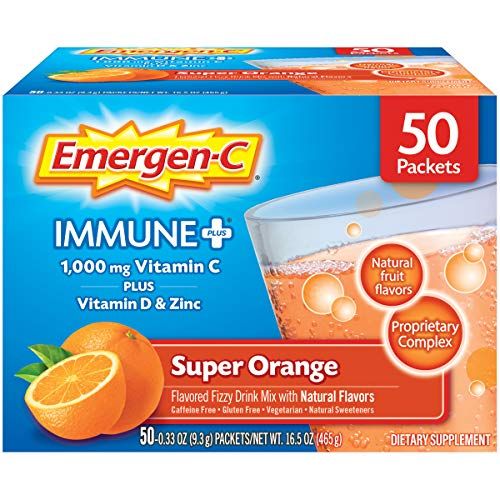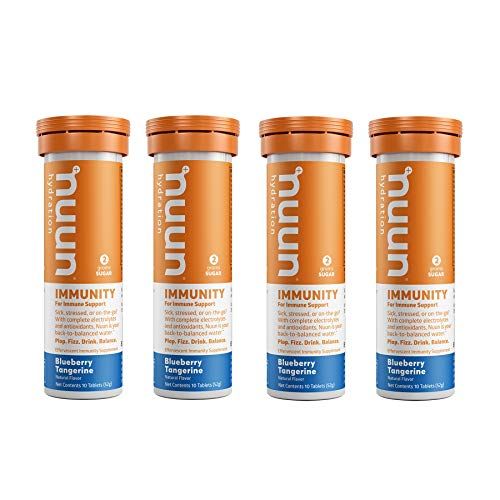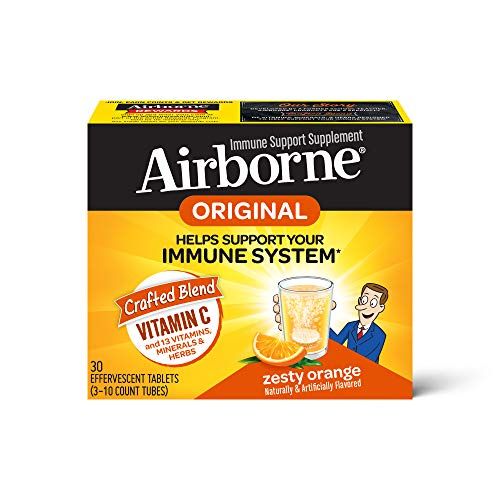Before I had my son, I would get sick twice a year and it was no big deal. Surprise, surprise: It’s a lot easier to avoid the common cold when you don’t have a germy toddler coughing in your mouth. Nowadays, little stands between a hot new virus and me, and as such, drinking Emergen-C and obsessive hand washing have become my weapons of choice.
Each time I mix the effervescent orange powder into my water (I prefer it to the chewables or gummies), I’m filled with a glass-half-full kind of attitude. Emergen-C makes me feel proactive—not to mention efficient. I would never dream of consuming 10 oranges in a single day, and yet that’s apparently the amount of vitamin C in *one* packet of Emergen-C.

In addition to containing 1,000 milligrams of vitamin C (the recommended daily dose for adults is anywhere from 75 to 90 milligrams, according to the National Institutes of Health), the supplement is full of B vitamins and antioxidants which the brand’s website claims support the immune system while enhancing energy levels. But can Emergen-C really keep sickness at bay? Or is it just another case of clever marketing forces at work?
First, let’s look at the ingredients in Emergen-C.
The main ingredients advertised in Emergen-C and many immune-boosting supplements are vitamin C and zinc. What I believed was the obvious draw with Emergen-C (or any immune booster like this kind, including Airborne, or Nuun immunity tablets) was the vitamin C for cold prevention. But while vitamin C has the reputation of being a savior if you’re getting or already have a cold, there isn’t actually much scientific evidence to back either of those claims up.
 Emergen-C Immune+Emergen-Camazon.com$17.99SHOP NOW
Emergen-C Immune+Emergen-Camazon.com$17.99SHOP NOW
It’s true that vitamins, including vitamin C, are crucial for our daily functioning and are healthy to consume. But if you already have a cold, it won’t actually help shorten the duration of a cold very much (no cure exists for the common cold!)—maybe a day, tops, according to Harvard Health.
“Emergen-C is a vitamin C supplement, and there’s no evidence that it benefits people with the cold or influenza or [that it] affects your propensity to get the cold or the flu,” says Amesh Adalja, MD, an infectious disease physician and a senior scholar at the Johns Hopkins Center for Health Security.
Dr. Adalja adds that it’s misguided to think that vitamin C is a panacea for respiratory viruses. Supplements aren’t evaluated by the FDA, and he worries that if people depend too much on vitamin C supplements or believe they will cure a cold or flu, it could steer people away from the number one preventive measure: the flu vaccine.
What about the other biggie ingredient zinc, you’re wondering? “Study results are mixed, but the short answer is that zinc probably doesn’t prevent or treat a cold,” Tina Ardon, MD, a family medicine doctor at Mayo Clinic in Jacksonville, Florida, previously told WH. There’s very limited evidence that zinc may help shorten a cold but only by a day or so as well, and you have to start taking it right at the onset of symptoms.
 Nuun ImmunityNuunamazon.com$13.98SHOP NOW
Nuun ImmunityNuunamazon.com$13.98SHOP NOW
Unfortunately, there’s no vaccine or magic fix for the common cold because it’s caused by a host of viruses. Practicing good hygiene and getting ample sleep are your best bets to kick a cold—and even then there are no guarantees, according to Dr. Adalja. Once you’re sick, however, there are over-the-counter medications like Dayquil and Nyquil that can help mediate your symptoms, he points out.
That doesn’t mean you have to stop taking vitamin C or other immune boosters if you enjoy the ritual of it, though.
Most Americans are vitamin C replete, meaning they’re already well-supplied with it for the most part via their diet, “so giving them extra vitamin C isn’t going to have any benefits,” explains Dr. Adalja. Vitamin C is water-soluble, so excess of the vitamin doesn’t get stored in the body and will be flushed out via your pee. This means that you won’t harm yourself by taking more vitamin C than you need.
 Airborne Zesty Orange Effervescent TabletsAirborneamazon.com$13.49SHOP NOW
Airborne Zesty Orange Effervescent TabletsAirborneamazon.com$13.49SHOP NOW
Indeed, the only time he would promote the use of a vitamin C supplement for the average American is if they ate hardly any fruits or veggies and were at risk of becoming deficient in a key vitamin (and you’d really only know this for sure via a workup from your doctor).
But on the fizzy orange bright side: Dr. Adalja says there’s no harm in taking Emergen-C or other vitamin C/immunity supplements. Although supplements in general are not regulated by the FDA, as mentioned, so-called immune-boosting supplements with these ingredients generally don’t come with side effects. The caveat: If you overdo it on zinc in particular, it may lead to anemia or nervous-system damage, WH reported previously. So be sure to stick to the recommended serving size for these cold supps.
Ultimately, if it makes you happy to ingest a vitamin C immune-boosting supplement like Emergen-C and you feel like you’re doing something good for your body, you’re sticking to a serving size, and you’re still getting your flu vaccine each year, there’s no need to kick your habit. After all, there’s something to be said for adding a daily dose of optimism to your diet when you’re feeling under the weather.
Source: Read Full Article
